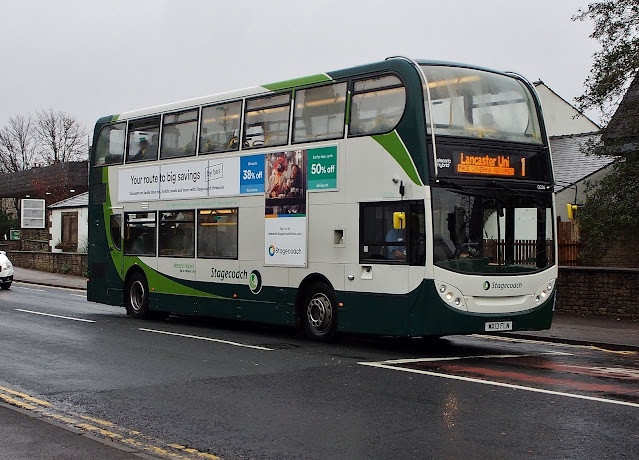 |
| Services to south Lancaster have been promised improvement |
Fears that promised improvements to bus services will be delayed and reduced in scope appear to have been confirmed, whilst hopes have been raised that short-term emergency funding will continue.
Recent correspondance from the Department for Transport (DfT) to English local authorities has hinted that the soon-to-end emergency funding for bus operators will continue, whilst confirming a delay to the submission of plans to improve services and reduced funding to implement them.
Hope for short-term funding
A report by bus industry trade journal Route One quotes a letter from the DfT admitting that the Omicron wave of Covid infections has increased uncertainty about the bus industry's ability to maintain services on a commercial basis after the current Bus Service Recovery Grant (BSRG) ends on 5th April.
BSRG compensates bus companies for the loss of income suffered during the pandemic, which has caused huge reductions in the numbers of passengers being carried. The government had anticipated that by April ridership would have recovered sufficiently to allow bus services to be provided commercially again, although in December buses were carrying only two-thirds of pre-pandemic passengers and the recovery had gone into reverse. At the same time, payments by councils to reimburse bus operators for carrying elderly and disabled passengers under the Concessionary Travel Scheme will be reduced in April and will be based on current levels of use rather than 2019 levels.
The government now risks embarrassment that just at the time its proposals to radically improve services under the "Bus Back Better" initiative are due to take effect, it will instead be hit by a wave of service reductions and fare rises as operators seek to adjust to the loss of emergency funding. "Route One" quotes a senior DfT official as saying that they are working with the bus sector to understand the problems and identify "what further action may be needed", leading to speculation that either BSRG will be continued or alternative funding provided.
Bus Service Improvement Plans
The DfT's letter also contains details of expected funding from April to the 79 "Enhanced Partnerships" of bus companies and councils that will deliver improvements to services set out in Bus Service Improvement Plans (BSIPs) published in June. These formed the basis for bids to the then £3 billion "Bus Back Better" fund promised to help implement them.
However, it now appears that the promised £3 billion has become just £1.4 billion. Still a substantial amount of money, but woefully inadequate to meet the cost of every local Partnership's plans, which are estimated at being between £7 and £10 billion in total. "Route One" says that it is not clear what has happened to all the remaining £1.6bn originally promised.
Delay
The government has also announced a delay to the introduction of "Bus Back Better" improvements. Originally, final detailled plans were to be submitted by the end of March 2022 and implementation to begin immediately.
Now, the deadline for submission has been pushed back to the end of April and then only draft plans are required. Partnerships are being advised to wait until they receive an indication of likely funding - promised "by February" - before finalising their Improvment Plans and and Schemes. No new implementation date has been announced.
The mis-match between the cost of meeting Partnership aspirations (up to £10bn) and the available funding (£1.4bn) creates huge uncertainty in how the money will be allocated. Available funds could be shared out on a pro-rata basis, with each Partnership receiving a small proportion of its bid, or the DfT could decide to reward the more ambitious Plans with a higher allocation, which might mean some of the others receiving nothing. Recognising that its money will not be enough to bring forward all the promised improvements, the DfT could even decide to instruct local Partnerships to prioritise their plans to meet its own preferred approach, removing the ability of local people to set their own objectives and priorities.
 |
| Cllr. Edwards |
County Councillor Charlie Edwards, Lancashire County Council's Cabinet Member, told the Bus Users' Group that the Lancashire Partnership had submitted an "ambitious" bid totalling £170m and that he expected to receive "an element" of that amount, which when combined with exisiting and expected local funding would allow improvements to be made.